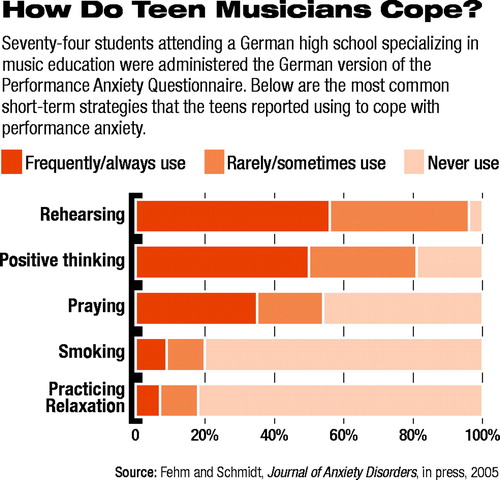Many Young Musicians Troubled By Performance Anxiety
Performance anxiety—classified as a variant of social anxiety in DSM-IV-TR—is relatively common among adult professional musicians. In the largest study of the subject to date, 16 percent of some 2,000 professional musicians reported that performance anxiety was a serious problem for them.
Performance anxiety among college-age music students has also been found to be quite high—with about 21 percent to 23 percent reporting suffering from it, and about 17 reporting that it has had a negative impact on their careers.
And now a new study in press with the Journal of Anxiety Disorders suggests that performance anxiety is quite common among teen musicians as well. It was conducted by Lydia Fehm, Ph.D., and Katja Schmidt, Ph.D., of the Technical University of Dresden in Germany.
Fehm and Schmidt explored performance anxiety in 74 pupils attending a Dresden high school specializing in music education. In addition to pursuing a regular academic curriculum, pupils at this school attend music classes and receive instruction in playing various instruments. Most of the students have been playing musical instruments since they were about 7 years old, and nearly half made their first public debut as musicians before age 8. Most plan to continue studying music after graduating from the school.
The subjects were assessed with the German version of the Performance Anxiety Questionnaire. It contains 20 items, tapping cognitive as well as bodily symptoms of performance anxiety. The frequency of each symptom is indicated on a five-point Likert scale.
A self-rating of performance anxiety was included, along with the questionnaire as a global measure of performance anxiety. There were questions about short-term and long-term strategies that the subjects used to cope with performance anxiety and whether they believe that they needed more help in dealing with it.
About one-third of the subjects reported being at least moderately distressed by performance anxiety. Ten percent said that performance anxiety was negatively impacting their music careers. Among the physical symptoms reported, nervousness and sweaty palms were the most frequent. Among the cognitive symptoms, fear of making errors and being overly critical of one's performance were most frequent.
The subjects indicated that they were more on edge when giving a solo performance than when playing chamber music or participating in an orchestra. Their angst also varied depending on their audience; teachers especially distressed them.
Interestingly, no link could be found between how long subjects had been performing publicly and how much they suffered from performance anxiety.“ This is in line with the findings of other studies, and it points to the fact that mere exposure to public performance does not automatically lead to a decrease in anxiety,” Fehm and Schmidt wrote in their report.

Short-term coping strategies that subjects used to counter performance anxiety included rehearsing difficult parts of a composition, positive thinking, praying, smoking, and practicing relaxation techniques. Only four of the subjects said they resorted to alcohol or illegal drugs for sedation. Subjects reported that rehearsing, positive thinking, and praying were moderately helpful in quelling performance anxiety; that practicing relaxation techniques was rather helpful, but that smoking was not very beneficial.
Long-term coping strategies that subjects used to combat performance anxiety included relaxation techniques; talking with classmates, friends, or teachers about their apprehensions; and seeking professional counseling or psychotherapy. Their perceived helpfulness of these strategies was in the medium to lower range.
Sixty-seven percent of the subjects indicated that they would like more help in dealing with performance anxiety.
“We were surprised by the rather high proportion of pupils reporting impairment due to their anxiety,” Fehm told Psychiatric News.“ We would have guessed that students would become more impaired once they decide to become professionals.”
“This study points to the insidious impact of the early expression of anxiety and again raises the possibility that early detection and intervention may improve the long-term course of affected individuals,” Mark Pollack, M.D., added. Pollack is an associate professor of psychiatry at Harvard Medical School and director of the Center for Anxiety and Traumatic Stress Disorders at Massachusetts General Hospital.
When asked whether musicians with performance anxiety often suffer from other kinds of social anxiety as well, Fehm replied: “To my knowledge, there is no conclusive evidence regarding this issue.”
An abstract of “Performance Anxiety in Gifted Adolescent Musicians” can be accessed online at<www.sciencedirect.com> by clicking on “Browse A-Z of journals,” “J,” and then“ Journal of Anxiety Disorders.” ▪



